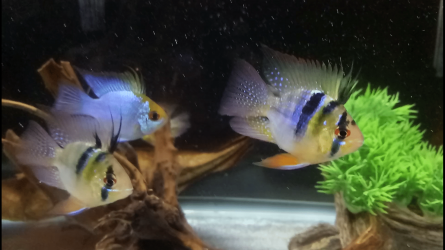Rapid respiration would suggest something in the water. Or possibly shock from a significant change between store water and your tank water. It also needs warmth, higher than many other tropical fish species, with 80F (27 C) absolute minimum. Recognize though that with this high a temperature you will have fewer tankmate options.
This is not a hardy fish. The balloon shape is achieved by being selectively bred with mid-body swelling and spinal curvature and are notorious for health problems related to swim bladder, digestive, and internal organ deformities,; they are genetically weak, susceptible to disease, and exhibit shortened life-spans. Some believe the fish suffer from this deformation, others are not so sure, but to be honest they should be avoided in order to discourage such things.
Frozen bloodworms should not be fed more often than once a week, as a treat. I'm not at all suggesting this is the problem, so quickly, but it is something to keep in mind for the future; it applies to all fish species. Cichlids do seem to have more problems with bloodworms, if I'm remembering correctly.


